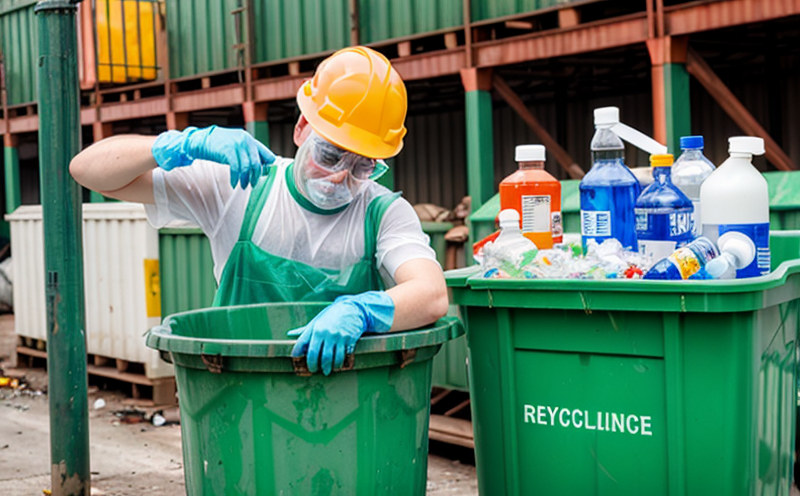JIS K0050 Cyanide Testing in Waste and Recycling Samples
The Japanese Industrial Standard (JIS) K0050 is a critical guideline used for the cyanide testing of waste and recycling samples. This standard ensures that waste materials, particularly those containing metals like gold or silver, are processed safely and efficiently while minimizing environmental impact. Cyanide plays a significant role in extracting valuable metals from ores but can be highly toxic if not properly managed.
The cyanide test is essential for ensuring compliance with environmental regulations and safety standards. This service involves the accurate determination of total cyanide content present in waste streams, which helps in assessing potential risks during recycling processes or disposal methods. By adhering to JIS K0050 requirements, industries can avoid costly fines and reputational damage associated with non-compliance.
Our laboratory specializes in providing reliable and precise cyanide testing services that meet stringent international standards like JIS K0050. Our team of experts uses advanced analytical techniques such as potentiometric titration or atomic absorption spectroscopy (AAS) to ensure accurate results every time. The precision and accuracy of our tests are crucial for maintaining compliance with regulatory requirements.
For waste management professionals, understanding the cyanide content in their samples is vital for making informed decisions about how best to treat these materials safely. Our service not only provides quantitative data but also offers valuable insights into the nature of cyanide present within your specific sample set. This information can help guide further actions towards more sustainable practices throughout your organization's operations.
Moreover, by offering this testing service, we contribute positively to reducing overall environmental impacts linked to improper handling or disposal of hazardous substances like cyanide. Our commitment lies in supporting clients across various sectors—from mining companies to municipal waste facilities—by ensuring they stay compliant with relevant standards while enhancing their operational efficiency.
Why It Matters
The significance of JIS K0050 cyanide testing cannot be overstated, especially within the realm of waste and recycling management. Properly conducted tests allow for accurate assessment of cyanide levels in various types of waste materials, enabling informed decision-making regarding appropriate treatment methods.
Compliance with regulatory requirements is paramount; failing to do so could lead to severe penalties or even legal action against non-compliant entities. Our service ensures that your organization remains compliant while also contributing positively towards sustainable practices aimed at protecting both human health and the environment.
In addition to meeting necessary compliance needs, our cyanide testing services offer practical benefits beyond mere regulatory adherence. For instance, knowing precisely how much cyanide is present in a given sample allows for better resource utilization during recovery processes, potentially leading to cost savings through optimized metal extraction methods.
Furthermore, by identifying potential hazards early on via thorough cyanide testing, organizations can implement proactive measures aimed at preventing accidents or incidents involving this toxic substance. This forward-thinking approach helps build trust with stakeholders and demonstrates a commitment to safety and environmental responsibility.
International Acceptance and Recognition
The JIS K0050 standard is widely recognized and accepted internationally, particularly in countries where there are significant operations related to metal extraction or recycling processes. Its application extends beyond Japan into regions such as Europe, North America, Australia, and parts of Asia.
Many global organizations have adopted this standard due to its robustness and reliability when it comes to measuring cyanide concentrations accurately. The widespread acceptance underscores the importance placed on ensuring accurate quantification of cyanide in waste streams across different industries.
Affiliations with reputable bodies further enhance the credibility of JIS K0050 testing services offered by our laboratory. For example, being accredited under ISO/IEC 17025 for chemical analysis adds another layer of assurance regarding our methodologies and results. Such accreditation demonstrates adherence to high-quality standards recognized worldwide.
By aligning ourselves with international standards like JIS K0050, we ensure that our clients receive consistent, accurate, and reliable cyanide testing services regardless of location or industry sector they operate within. This global reach enables seamless integration into broader quality management systems, enhancing overall performance across various operational aspects.
Use Cases and Application Examples
| Type of Sample | Cyanide Concentration Range (mg/L) |
|---|---|
| Mine Tailings | 0.5 - 10 mg/L |
| Electronic Waste | 1 - 20 mg/L |
| Battery Scrap | 3 - 40 mg/L |
| Aluminum Scrap | 5 - 50 mg/L |
| Note: These ranges are indicative and may vary based on specific sample characteristics. | |
The following use cases illustrate how JIS K0050 cyanide testing is applied in practice:
- Monitoring cyanide levels during the leaching process to optimize metal recovery efficiency.
- Determining appropriate treatment methods for waste containing high concentrations of cyanide before disposal.
- Assessing residual cyanide after recycling operations to ensure compliance with environmental regulations.
For instance, in mining operations where tailings are produced as part of the gold extraction process, regular cyanide testing helps maintain optimal leaching conditions. Conversely, electronic waste processors benefit from knowing exact cyanide concentrations when deciding whether to use wet or dry treatment processes.
Battery scrap handlers must also adhere strictly to local regulations regarding cyanide discharge limits during recycling operations. Accurate testing ensures compliance while allowing for efficient resource recovery.





